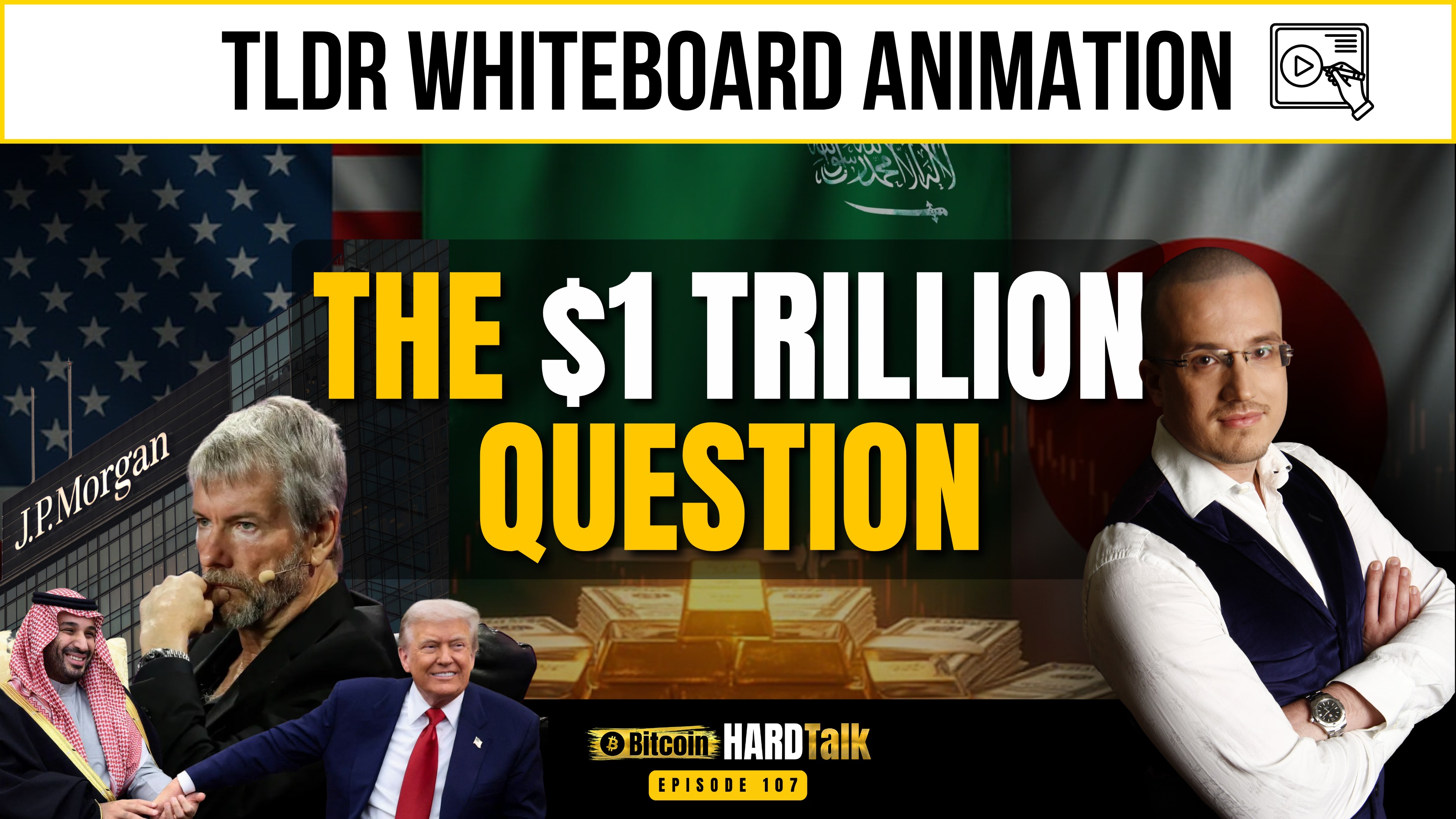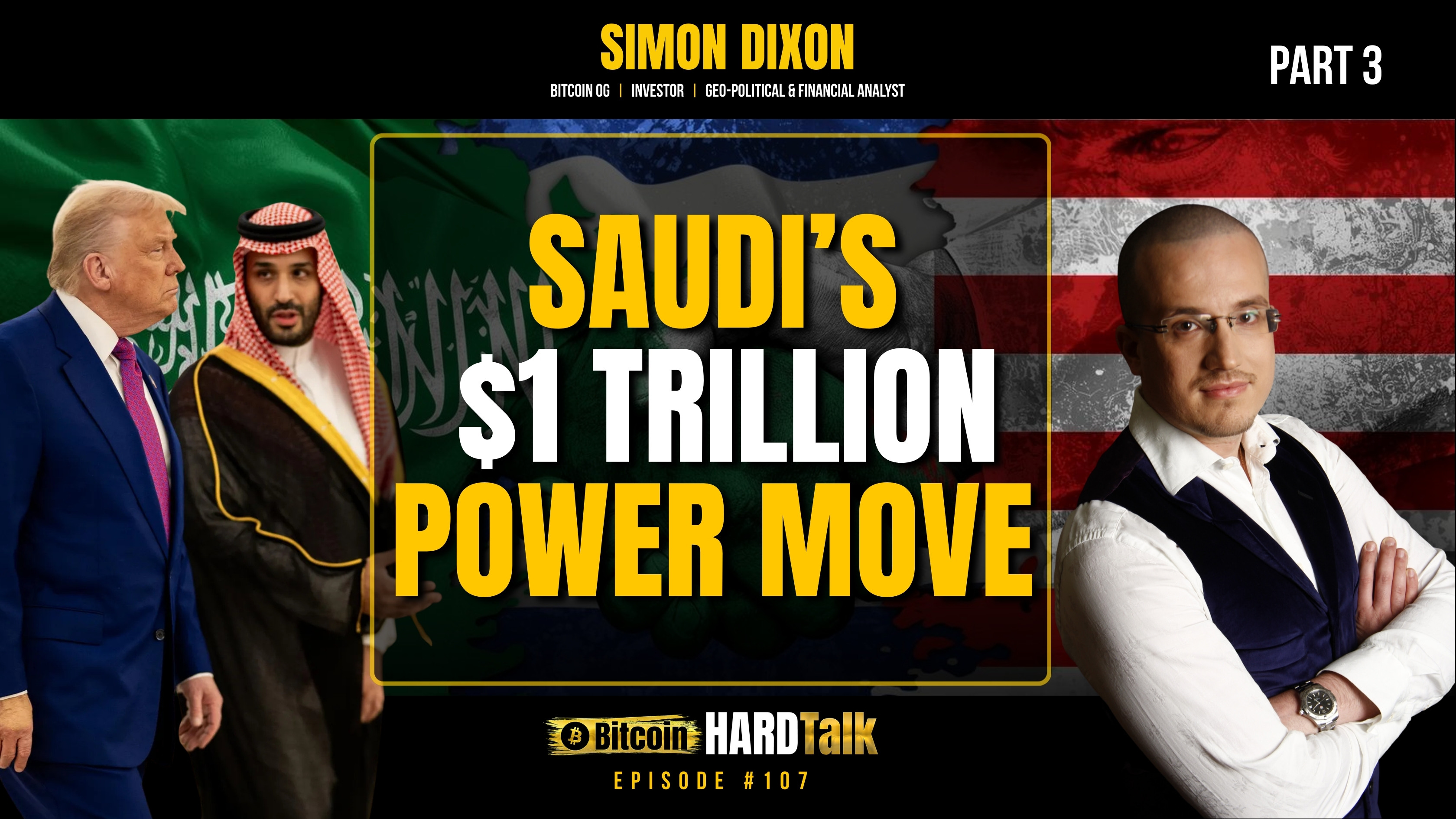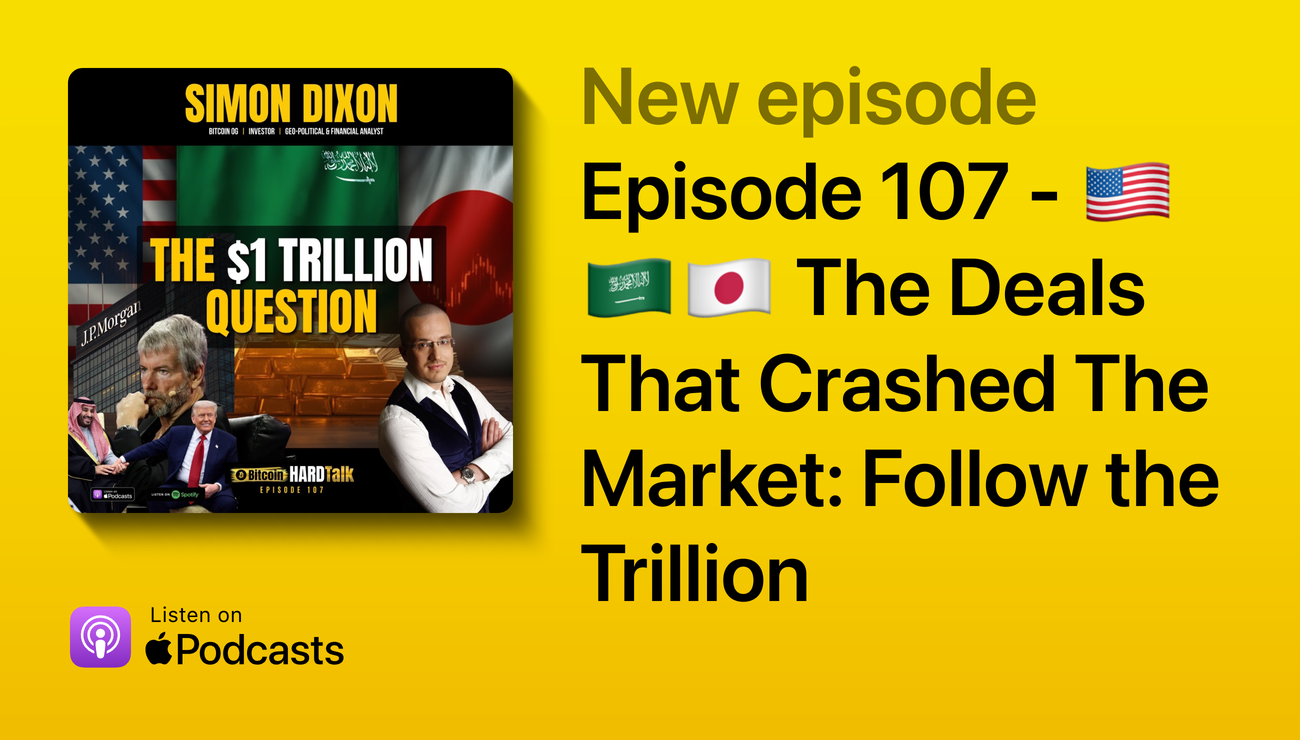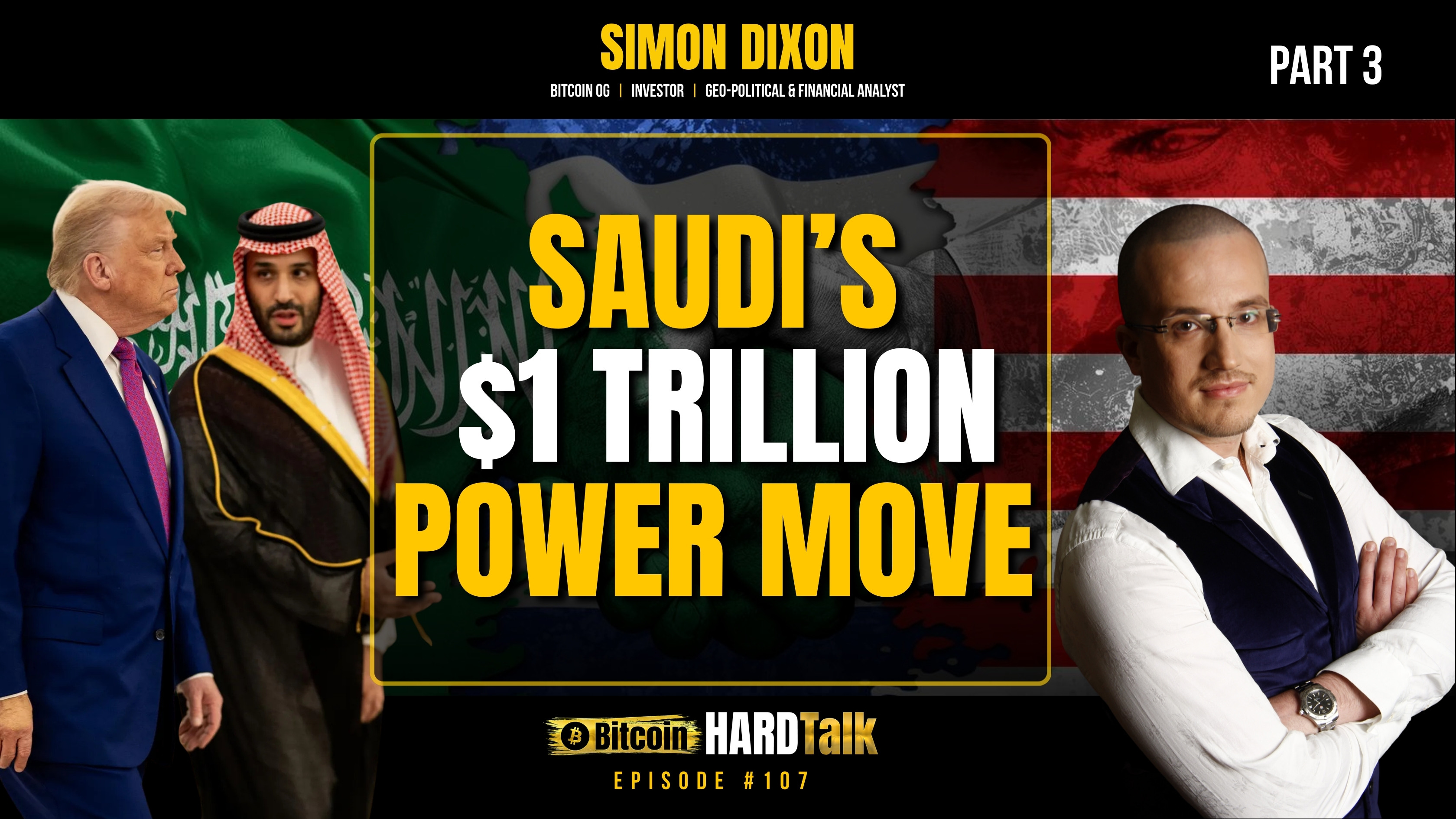🇺🇸🇸🇦🇯🇵 The Deals That Crashed The Market: Follow the Trillion | This Week in Bitcoin, Macro & GeoPolitics | #BitcoinHardTalk Ep.107
Nov 21, 2025Don't Have Time To Watch The Full Episode?
Watch the TLDR Ai Summary
Watch the Video (Duration: 24 minutes)
Watch the TLDR Whiteboard Explainer Video
Watch the Video (Duration: 5 minutes)
Hey hey Bitcoin Wealth Builders,
If you're wondering why both Bitcoin and the stock market took a nosedive this week, the real story isn’t in the mainstream headlines. The crash was a symptom of interconnected, high-stakes deals between the US, Saudi Arabia, and Japan that are reshaping the global order. This is the essential TLDR of BitcoinHardTalk Episode 107, my 2-hour and 56-minute live broadcast from November 21st, 2025. Here, we connect the dots across Bitcoin, macroeconomics, and geopolitics to reveal the true forces at play.
Part 1: This Week In Bitcoin - Did J.P. Morgan & Saylor Just Crash Bitcoin?
Watch the Video (Duration: 36 minutes)
I believe the recent Bitcoin crash was an engineered event, orchestrated by what I call the "financial industrial complex." The primary weapon used in this operation was a direct warning shot fired by J.P. Morgan at Michael Saylor's MicroStrategy—a company positioned as a tool for centralizing and controlling large amounts of Bitcoin.
J.P. Morgan's threat was both subtle and powerful: they warned that MicroStrategy (MSTR) is at risk of being reclassified from an "operating company" to an "investment company" under the 1940 Investment Company Act. The consequences of this reclassification would be catastrophic for its stock price. It would trigger a potential exclusion from major indices like the MSCI USA and the NASDAQ 100, forcing passive funds into a massive, coordinated sell-off and putting nearly $9 billion in market value at risk.
To maximize market anxiety, the deadline for this decision was set for January 15th. I believe this timing is weaponized to create a long window of fear through December, perfectly coinciding with end-of-year performance reviews for hedge funds. It allows the financial industrial complex to manipulate returns, knock underperforming funds off the network, and consolidate power.
"Strategy is essentially a tool for market manipulation and Bitcoin manipulation. [...] Anybody that joins and goes public... becomes subordinate to the proof of weapons network."
This engineered FUD (Fear, Uncertainty, and Doubt) was designed to create a cascading effect. First, it flushes out traders using leverage, as evidenced by the immediate margin call notifications from platforms like Strike. Second, it puts immense pressure on other Bitcoin treasury companies. Nakamoto, for example, announced they had to sell 367 BTC for $35 million just to cover operational costs like salaries and legal fees—adding fuel to the selling pressure.
While leveraged traders and weak-handed treasury companies were forced to sell, sophisticated long-term players used the dip as a strategic buying opportunity. El Salvador, continuing its nation-state accumulation, bought another 1,000 BTC. The Harvard Endowment Fund, one of the most powerful institutional players, tripled its holdings in Bitcoin ETFs.
This is the game being played. The financial industrial complex manipulates the short-term price to shake out weak hands, liquidate leveraged players, and consolidate control. Your path to winning is to refuse to play their game. The long-term strategy remains unchanged: own more Bitcoin each month than you did the last, hold it in self-custody where it has no overhead, and avoid using leverage. This is how you beat the proof of weapons network and its short-term price manipulation.
Part 2: This Week In Macro - Did Japan’s Bond Shock Crash Global Markets?
Watch the Video (Duration: 26 minutes)
While the J.P. Morgan threat was the weapon used against Bitcoin, the correction in the traditional stock market was not random. It was directly triggered by a "bond shock" originating from Japan, signaling a major unwinding of global capital flows.
For years, one of the biggest trades in the world has been the "Japan carry trade." In simple terms, hedge funds and large investors borrow massive amounts of Japanese Yen at nearly 0% interest. They then use that cheap money to buy higher-yielding assets around the world, like US stocks and U.S. Treasury bonds, pocketing the difference. This has been a key source of liquidity propping up global markets.
That entire paradigm is now reversing. This week, the Bank of Japan began raising interest rates again, causing the yield on its 20-year government bond to surge to an all-time high of 2.75%. Suddenly, it has become much more attractive for investors to bring their money back to Japan. This forces a massive unwinding of the carry trade. To pay back their Yen-denominated loans, these investors must sell their global assets—including U.S. stocks. This coordinated selling pressure is what triggered the sharp correction we saw.
This is not a market accident in my opinion; it is part of a deliberate, long-term strategy to reshape the global financial system.
"This is not a natural phenomenon. This is an engineered phenomenon... you can slowly manage a transition."
The "proof of weapons network" is engineering a managed transition away from a U.S. dollar-centric world. By allowing Japan to raise rates, they are strategically weakening the dollar, forcing capital to be repatriated, and steering the world toward the multipolar financial system the proof of weapons network have been planning.
This trend is set to continue. The next Bank of Japan meeting is on December 18th, and markets are already pricing in a 50% chance of another rate hike. The unwinding has just begun.
Part 3: This Week In GeoPolitics - How The Saudi & US $1 Trillion Deal Weakens Israel?
Watch the Video (Duration: 1 hour 54 minutes)
To grasp the gravity of this week's $1 trillion deal between Trump and Saudi Crown Prince Mohammed bin Salman (MBS), you must understand it as the culmination of a 50-year struggle that began when King Faisal weaponized oil against the US in 1973—and was assassinated shortly after. This week's White House meeting wasn't just a trade agreement; it represents one of the most significant geopolitical realignments since the 1970s and signals the end of the old Middle East power structure.
To understand this deal, you must discard the outdated notion that Saudi Arabia is a mere puppet of the United States. This is a partnership between two powerful factions: the "financial industrial complex" (represented by Trump and Wall Street) and the immense sovereign wealth of the Gulf Cooperation Council (GCC), which is being fueled by oil sales to its largest customer, China. Together, they are reshaping the Middle East for a new era of technology and finance.
The agreement announced during the visit has several monumental components:
- A massive $1 trillion Saudi investment into U.S. infrastructure and technology.
- The U.S. will greenlight the export of advanced AI chips to tech giants in the Gulf.
- A formal U.S.-Saudi agreement to develop a civil nuclear energy program in the Kingdom.
- The designation of Saudi Arabia as a "major non-NATO ally."
The most profound implication of this deal is what it means for Israel. For decades, the "military-industrial complex" used Israel as its primary tool for regional destabilization—a "forever war" model that propped up the U.S. dollar by generating conflict. This new U.S.-Saudi alliance, focused on regional stability for finance and technology, makes Israel's old role completely obsolete.
"Israel is no longer needed under this vision. And Israel is a destabilization proxy. And so, strategically weaken Israel, turn it into a vassal state, turn it into a pariah state, and then make sure that Israel catches all the blame."
This strategic pivot is what is finally making a resolution to the Palestinian conflict possible. During the visit, MBS reiterated Saudi Arabia's long-standing and non-negotiable position: full normalization with Israel requires a clear and irreversible path to a Palestinian state. Confirming this dynamic, a US-backed peace plan for an international security force and transitional administration passed at the UN for the first time, with Russia and China abstaining rather than blocking the measure—a clear signal that the financial powers have made their decision.
Your Path Forward in a Changing World
The crashes in the Bitcoin and stock markets were not isolated events in my opinion. They were the tremors of a much larger, coordinated geopolitical and financial pivot. The financial industrial complex is managing a transition away from the U.S.-dominated unipolar world and toward a multipolar order built on new alliances and new technologies. The chaos is manufactured, the transition is deliberate, and the goal is to maintain control while the system is reset.
As we shift from a world run by nations to one run by global financial networks, what steps are you taking to secure your own sovereignty?
Join the Conversation
The forces shaping our world are moving faster than ever. The old rules no longer apply, and you cannot afford to be misinformed.
- Share this post with anyone who needs to understand the real story behind the headlines.
- Subscribe to my YouTube and Rumble channels to catch future live episodes of BitcoinHardTalk.
- Follow me on X, where I provide real-time updates and analysis in between episodes.
- Click here and join my free newsletter for digital copies of my books and my course on Bitcoin self-custody.
Watch The Full Breakdown
For the complete, unfiltered analysis, you need to see the full episode.
- Watch the full episode video (Duration: 2 hours 56 minutes) Click here
- Be sure to also watch Part 1 (This Week in Bitcoin), Part 2 (This Week in Macro) and Part 3 (This Week in Geopolitics)
Watch Part 1 here.
Watch Part 2 here.
Watch Part 3 here. - Watch the TLDR Ai Summary (Duration: 33 minutes). Click here
- Watch the Whiteboard Explainer Video (Duration: 6 minutes). Click here
Listen on the Move?
Podcasts Now Available on Apple Podcasts & Spotify
Related Blog Posts
Did J.P. Morgan & Saylor Just Crash Bitcoin? #BitcoinHardTalk Ep.107 | This Week in Bitcoin (Part 1)
Did Japan’s Bond Shock Crash Global Markets? #BitcoinHardTalk Ep.107 | This Week in Macro (Part 2)
How The Saudi & US $1 Trillion Deal Weakens Israel? #BitcoinHardTalk Ep.107 | This Week in GeoPolitics (Part 3)
Simon Dixon🚀
Bitcoin OG | Investor | Geo-Political & Financial Analyst
Disclaimer
This article is a summary and analysis of information presented in BitcoinHardTalk Episode 107. It is for informational and educational purposes only and constitutes financial analysis, not investment advice. The views expressed are part of a systemic analysis focusing on how global financial networks and power structures operate. Mentions of individuals or institutions are for illustrative purposes within this analytical framework and should not be interpreted as personal attacks. Concepts like the "proof of weapons network" and the "financial industrial complex" are used as models to understand complex geopolitical and economic events. All investors and individuals should conduct their own thorough research and consult with a professional financial advisor before making any financial decisions.











